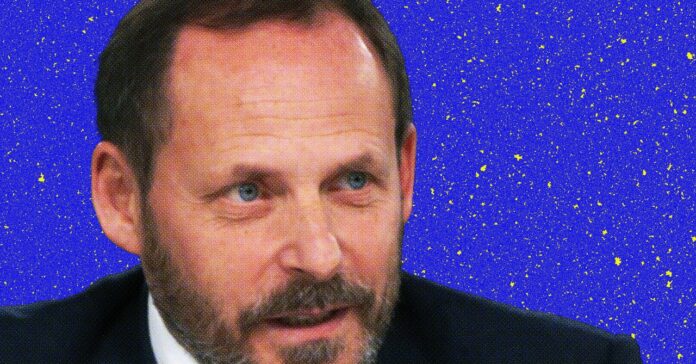The billionaire Arkady Volozh, known as the architect of “Russia’s Google,” valued at $30 billion at its peak, has long had an apolitical public persona. “I don’t have friction with the state,” Volozh told WIRED in 2017. “Just like I don’t have friction with the weather. What happens if it’s raining? I need to build a service to avoid the rain.”
Still, Volozh couldn’t avoid the rain. Following Russia’s invasion of Ukraine, he was targeted by EU sanctions personally and forced to step down from Yandex, the internet giant he built with the late Ilya Segalovich. Today the tech billionaire is announcing his comeback as CEO of a new European AI company. The Nebius Group is technically a reinvention of Russian internet giant Yandex. Volozh and his team have spent the past two years in complex negotiations with the Kremlin, selling off parts of the business still based in Russia, including the search engine.
For the famed Russian internet giant, Yandex’s Dutch parent company (Yandex NV) was forced to accept a cut-down price of just $5 billion, under Russian rules for western firms trying to leave the country. Out of that deal, however, Volozh’s team were able to salvage parts of Yandex that were already based abroad, including four business units focused on AI. These are the assets that will be rebranded and turned into what Volozh hopes will become one of the leading AI infrastructure companies in the world.
“This life is different,” Volozh says, of his new role as CEO of Nebius. “It feels very good to be free and to start something new.”
On Monday, sitting in an office in Amsterdam, Volozh doesn’t want to talk politics. He wants to focus on his brand-new project. The main part of Nebius’ business will be its cloud division and Volozh wants to offer AI developers access to big tech-style infrastructure without the conflicting interest of the US giants that are building their own models on the side. “We are building infrastructure for the people who build the models to build AI,” says Volozh, explaining the plan behind Nebius.
Nebius owns one data center in Finland—where it plans to triple capacity this year—and is building several others from scratch with “hundreds of megawatts capacity each,” Volozh says, emphasizing the company already has billions in capital and plans to raise more.
Until Nebius’ new data centers are built—primarily in Europe—the company is renting space in tens of data centers that already exist. “With rented capacity, [we] will exceed 100 megawatts,” he says. “People are understanding more and more that the next main bottleneck is the infrastructure itself—it’s the data centers, the energy—this is one of the key chokepoints for this industry.”
Volozh as CEO is not the only similarity between Yandex and Nebius. Out of the 1,300 people working for the new company now in Europe, “many of them” used to work at Yandex in Russia, Volozh says. He also plans to replicate the same formula that made Yandex such a success: Nebius has units dedicated to self-driving, data labeling, and education tech. “We hope that this AI cloud [business] will be our main revenue source for the beginning and it will give us an opportunity to grow other things,” Volozh explains.
Under President Vladimir Putin, it was inevitable that a company so big would become enmeshed in politics. Volozh left Russia (but not Yandex) for Israel in 2014, the same year the country annexed Crimea. The company was lambasted by Putin himself the same year for being under Western influence in its early days, and the late opposition activist Alexei Navalny criticized its news aggregator service (since sold) for burying articles about his anti-government activities.
Others turned on Yandex in the aftermath of Russia’s invasion of Ukraine in February 2022. Former employees accused the company of collaborating with the military, and the European Union sanctioned Volozh personally for “supporting, materially or financially, the Government of the Russian Federation” through his role as CEO of a company that was “promoting state narratives in its search results.” Later that year, anti-war protesters began squatting in (and, he says, destroying) his Amsterdam mansion.
The same day sanctions against him were announced, Volozh stepped down as Yandex CEO. The criticism the company faced after the war began references a time when he had no control over Yandex, Volozh now claims. “That was one of the reasons actually for us [Volozh and his Yandex team] to leave, because you couldn’t influence [the company] anymore,” he says.
In August 2023, he became the rare Russian business leader to publicly condemn the war in Ukraine. “Russia’s invasion of Ukraine is barbaric, and I am categorically against it,” he said in a statement. Today, he emphasizes that he stands by those words, even though he cannot comment publicly on why he waited 18 months after the invasion to speak out. “My views are the same as they were almost a year ago,” he insists.
After Volozh spoke out against the war and moved to sever ties with Russia, the EU lifted the sanctions against him in March, earlier this year. On Monday, after almost two years, the sale of Russian assets was also declared done. “All connections with Russia have now been severed,” John Boynton, Yandex NV chairman, announced, clearing the way for Volozh’s return.
Volozh is hoping this will be a new, less political chapter in his life. “We’re building the basic infrastructure, which is very much non-political, unlike what Yandex turned out to be,” he says. And he doesn’t anticipate Nebius being his final venture. “This is just yet another company,” he says, “and I hope [it will be] much bigger, better than what was built before.”
Source : Wired















